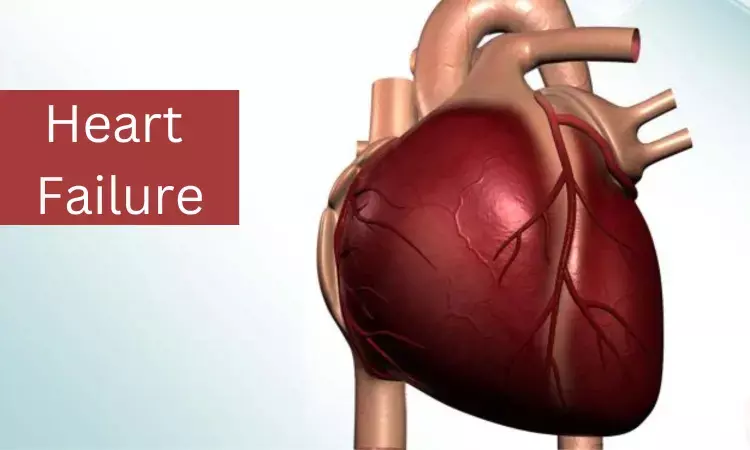- Home
- Medical news & Guidelines
- Anesthesiology
- Cardiology and CTVS
- Critical Care
- Dentistry
- Dermatology
- Diabetes and Endocrinology
- ENT
- Gastroenterology
- Medicine
- Nephrology
- Neurology
- Obstretics-Gynaecology
- Oncology
- Ophthalmology
- Orthopaedics
- Pediatrics-Neonatology
- Psychiatry
- Pulmonology
- Radiology
- Surgery
- Urology
- Laboratory Medicine
- Diet
- Nursing
- Paramedical
- Physiotherapy
- Health news
- Fact Check
- Bone Health Fact Check
- Brain Health Fact Check
- Cancer Related Fact Check
- Child Care Fact Check
- Dental and oral health fact check
- Diabetes and metabolic health fact check
- Diet and Nutrition Fact Check
- Eye and ENT Care Fact Check
- Fitness fact check
- Gut health fact check
- Heart health fact check
- Kidney health fact check
- Medical education fact check
- Men's health fact check
- Respiratory fact check
- Skin and hair care fact check
- Vaccine and Immunization fact check
- Women's health fact check
- AYUSH
- State News
- Andaman and Nicobar Islands
- Andhra Pradesh
- Arunachal Pradesh
- Assam
- Bihar
- Chandigarh
- Chattisgarh
- Dadra and Nagar Haveli
- Daman and Diu
- Delhi
- Goa
- Gujarat
- Haryana
- Himachal Pradesh
- Jammu & Kashmir
- Jharkhand
- Karnataka
- Kerala
- Ladakh
- Lakshadweep
- Madhya Pradesh
- Maharashtra
- Manipur
- Meghalaya
- Mizoram
- Nagaland
- Odisha
- Puducherry
- Punjab
- Rajasthan
- Sikkim
- Tamil Nadu
- Telangana
- Tripura
- Uttar Pradesh
- Uttrakhand
- West Bengal
- Medical Education
- Industry
Ghrelin can improve cardiac function among patients with heart failure: Study

Sweden: A clinical study published in the European Heart Journal has revealed that the hunger hormone ghrelin can boost heart pump capacity in patients with heart failure.
Ghrelin is an endogenous hormone with many receptors in cardiac muscle tissues. It increases the appetite and stimulates the release of growth hormones. The researchers believe its receptors are a promising target for enhancing the heart’s pump function.
Millions of people worldwide live with heart failure, a condition in which the heart's pump function is reduced, such as after myocardial infarction or angina. In heart failure, the heart muscle is weakened, leaving the heart unable to pump the blood needed to provide the body with sufficient oxygen and nutrients. Treatments are available that slow the disease's progression, but no methods directly increase the heart’s pump function.
“Heart failure is the most common cause of hospitalisation in older generations and is associated with a poor quality of life and high mortality,” says principal investigator Lars Lund, professor at the Department of Medicine, Solna, Karolinska Institutet, and senior consultant at Karolinska University Hospital. “If we can find ways to increase the heart’s pump function, we can potentially improve life quality and prognosis for these patients.”
In this double-blind study, 30 patients with heart failure at Karolinska University Hospital’s cardiology unit were randomly assigned to two groups, receiving either active treatment with ghrelin or a placebo given intravenously for two hours. The participants were followed up after two to five days.
After two hours’ treatment, the cardiac output (i.e. the volume of blood pumped by the heart in one minute) had increased by an average of 28 percent in the ghrelin group, which can be compared with a small reduction in the placebo group. The increase was because more blood was pumped from the heart per beat, as the heart rate remained unchanged or was even slightly slower. At the two- to five-day follow-up, the pump capacity was 10 percent higher in the ghrelin group compared to in the placebo group.
The researchers observed no serious adverse reactions. For reasons unknown, the ghrelin group had slightly elevated levels of a heart failure biomarker, but more studies would be needed to ascertain any actual connection. Because the patient group in the current study was small and the follow-up short, it is hard to estimate the effectiveness of the treatment in a larger cohort over a longer time.
The researchers also studied mouse heart cells in the laboratory to study the underlying mechanisms responsible for the increase in pump function. They observed that treatment with ghrelin increased the contractile function of the heart cells, and they identified a novel molecular mechanism for this increase.
The researchers now want to conduct larger clinical studies. With the help of the KI incubator, KI Innovations have launched AnaCardio. This start-up company develops molecules designed to activate the ghrelin receptors and thus increase the heart’s pump function.
Some researchers have reported potential conflicts of interest, including consultancy and lecture fees from various pharmaceutical companies. Lars Lund founded AnaCardio, which is developing a ghrelin-based therapy for heart failure.
Reference:
Lars H Lund, Camilla Hage, Gianluigi Pironti, Tonje Thorvaldsen, Ulrika Ljung-Faxén, Stanislava Zabarovskaja, Kambiz Shahgaldi, Dominic-Luc Webb, Per M Hellström, Daniel C Andersson, Marcus Ståhlberg, Acyl ghrelin improves cardiac function in heart failure and increases fractional shortening in cardiomyocytes without calcium mobilization, European Heart Journal, 2023;, ehad100, https://doi.org/10.1093/eurheartj/ehad100.
Dr Kamal Kant Kohli-MBBS, DTCD- a chest specialist with more than 30 years of practice and a flair for writing clinical articles, Dr Kamal Kant Kohli joined Medical Dialogues as a Chief Editor of Medical News. Besides writing articles, as an editor, he proofreads and verifies all the medical content published on Medical Dialogues including those coming from journals, studies,medical conferences,guidelines etc. Email: drkohli@medicaldialogues.in. Contact no. 011-43720751


